History

Takis Edema

Autobiography
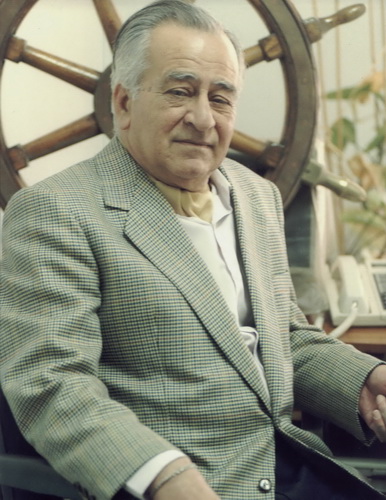
"Mr. Takis Edema
1 Oct 1927 - 16 October 2001"
|
Takis Edema was born in Limassol on 1st October 1927. As a little boy he gave no big problems to his parents. He was friendly with his neighbour boys and girls of his age. They used to play together in each other's houses. One of the games was that of the "Doctor"; someone, usually a girl, was pretending to be sick and the doctor was invited to examine her. An injection was usually necessary. Another game "The Marriage"; a girl and a boy, the bride and the bridegroom, were arranging for a reception. This necessitated some previous work. Preparation of some mini-"kourapiedes" was the offering to the guests. Another game "Kriftoulis"; this was popular when a new house was under construction chasing one another in the foundation corridors. Usually the boys ran after the girls. If I catch you.......
At the age of 4 he started going to a so called school for little children in the neighborhood. At the beginning he didn't like it and he was crying his eyes out every time that his mother was taking him there, with his pockets full of koufetes, koulouria etc. Eventually he got used to it and he started using colours for painting, papers for making ship and airplane models etc. By the age of 6, he got into the elementary school. He did not enjoy studying. He was playing in the street during the afternoon until it was dark. There was no electric light. Petrol lamps were used. Generally speaking, he was not a brilliant student but somehow he managed to graduate when he was 12 thanks, mainly to the constant attendance and shouting of his mother.
|
The following year, he joined the Limassol gymnasium. He managed to surpass the 1st class. In the 2nd class things were not so easy, particularly in mathematics. At the end of the year, he was given just above the average but not even that in mathematics where he got 4 out of 10 marks. It was a rainy day and Mrs. Olymbia, his mother, was anxiously waiting at noon time on the pavement outside the house so that she gets the test paper before she lets him in the house. As soon as she saw the results, she threw the paper into the river of rain-water. Little Takis was scared and started running after the paper, knowing that he had to take it back to the school duly signed by one of his parents.
Unfortunately during this year of 1939, Solomon, the father of Takis, had died due to an incurable disease. In view of this and also the fact that Takis was not a fanatic student, it was considered a kind of superfluous expense on the part of Kyria Olymbia to afford the payment of five shilling per month to the school. Takis, though not a good student, he was very conscientious and after discussing with his family it was agreed to start working since the monthly subsidy that they used to get from the municipality, being a poor family, could hardly cover the school fees of Demetra, the 2 years older sister of Takis who was a brilliant student; the best in the class.
With some difficulty, due to his young age of 12 years, Takis found his first job as a labourer in the military airport outside Limassol. He was eventually placed as a waiter in the dining room of RAF officers (a tent). This was not a hard job. It was good because he also had the chance to fill a small tin that he was carrying with him, with butter or marmalade, rather expensive to buy at that time (Second World War).
Few months later, Michalis, an old friend of the family, who was employed by the British Army as a Time-Keeper, offered to Takis another job, somehow harder but more paying. However, he had to go and live in a village the "Kalo Chorio", about an hour by lorry from Limassol. He rented a room there with another 5 persons in a house. From there, every morning he had to walk for 5-6 miles to reach the little village of "Athrakos" where a road was under construction, returning back in the late afternoon. Luckily the Chief Foreman who was entitled to have a donkey, was letting Takis ride it when he was getting tired. The standard meal everyday for the workers and for Takis of course, consisted of a slice of bread, some olives and one onion, all wrapped in a big handkerchief.
As usual, this job came to an end in a couple of months Takis had to look again for another job elsewhere. He applied to the General Supplies Stores of the British Army (FSD) and luckily, they needed a messenger for the office. It was made clear to me that amongst my other duties, I had to bring the coffees ordered by the clerks from the coffee-shop, about 150 meters away, which I accepted believing that it would not be a difficult task. It proved eventually not to be so easy particularly when it was raining and I had to walk on a slippery and muddy ground and still bring the coffees in good shape.
One day, I had applied to the Sergeant in-charge for permission to take that afternoon off because my only sister was getting married. He did not appear willing to agree and he even went on asking me, in an ironic way, if the reason I wanted to be there was "for watching the baby". I did not comment on his nasty remark. I went to the cashier and asked for my money and left the job.
My brother-in-law, Thoukis Georgiades,, was already employed by the NAAFI Limassol Club, as, what they called, a "charge hand" and he managed to arrange for a post that did not exist before,, i.e. for someone to go round the tables and collect the empty cups of the soldiers who had been taking their cup of tea. This was a suitable job for me. Out of the blue, one day Takis came across the Chief Superintendent of all NAAFI Institutions in Cyprus, Captain Guy, who was there to inspect the Limassol Club. The Captain started conversing with Takis and, at a moment, he said to Takis: "I see a lot of future in you young man". Takis, jokingly but, modestly and tactfully speaking, asked the Captain if he meant that henceforth we would be collecting plates instead of cups, likewise meaning that he did not consider himself capable of doing something more important. The Captain, disregarding Takis' remark, went on to say: "But you have to be in uniform," Takis having realized the insinuation, answered: But I am under the age of 18. The Captain said: This is your problem!
Takis explained to his mother what happened and tried to convince her that it was the opportunity of his life i.e. He would be in a better position to support the family and at the same time he would improve considerably his knowledge in the English language and last but not least, he would become a man (not a boy any more). I, Kyria Olympia was adamant, not willing to listen to this possibility. She did not want her son at the age of 16 to go abroad and the more so during war time. Takis, being ambitious and anxious to become able to support his family to the maximum possible, had taken the big decision! He walked for about 2 hours to reach Polemidia, the Training Center. He found the Recruiting Officer, Major Kareklas, a Cypriot ex Police Superintendent who had accepted Takis declaration of 18 years of age. He was escorted to a big tent in the Training Center where he found about 40 other people (much older than him), employees of NAAFI who had subscribed for going to Egypt. We all went through a training course for a month or so and, one day, we were all taken by a lorry to Famagusta were we boarded the RMS "Fouadieh" which operated the line Cyprus-Israel-Egypt. Needless to say that my joining the army and my departure abroad had caused to my mother a lot of anxiety and worry. Her hair turned white overnight.
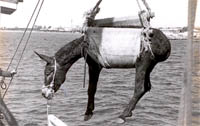
"Precious Cargo Handling - Cyprus donkey exports during World War II"
|
|
We arrived at Port Said and from there, by lorries, we were taken to Suez, Ismailia and last but not least, "Fanara" a little Arab village where we were stationed. Before leaving Cyprus we were actually given a postal address "RASC/EFI P.O.Box 1006 Cairo" and we were quite disappointed to find ourselves stationed in Fanara. Naturally, Takis was terribly missing his home but he was somehow pleased with his Cypriot colleagues, some Greeks from Alexandria, and his Egyptian collaborators and assistants. Sergeant Periklis Metaxas, a Greek from Alexandria, was a real friend with a fantastic sense of humour. Mansour, my assistant at the counter, an Egyptian boy, was always ready to help and give advices concerning security in the Arab village. Some 8 months later, I was informed that I am being transferred to Italy, I already had some information about Mafia being interfered with the NAAFI and perhaps one would himself obliged to co-operate with them or else.........................
|
I asked for an interview with Capt. Monteque who was the Commanding Officer and tried to convince him that I should stay in Fanara, not to go to Italy. He told me that in the military dictionary the word "No" does not exist. Under the circumstances, I said, I shall apply for a discharge on the grounds that I am under age. The Captain was amazed to hear my statement but, believed in me and promised to submit my application to the necessary quarters. The case was transmitted to H.Q. Cairo and a date was fixed for the trial. I was taken to Cairo to attend the Court Martial. Thanks to my previous good conduct, I was discharged without any punishment. Two days later I was boarding the ship for Cyprus via Haifa. I had to stay in the Transit Camp of Haifa for 2 days. In the morning of the second day, there was a medical inspection by the Military Doctors and we all had to stay in line with our clothes off. When the Doctors were passing by me, one of them had stopped in front of me and was looking at my small penis. I realized what he was thinking and hastened to explain that I was actually going for discharge due to my young age. They found it hard to believe because they had never come across such a case in the British Army. I boarded again the ship in the afternoon and the day after I was landed at Famagusta. Soon I was put on a truck and two hours later I could see Limassol from a distance of about 10miles. I didn't believe my eyes. What a sensational feeling. I couldn't believe myself being back to my native town. Whilst the truck was in town and passing by a street in my neigbourhood, I saw some people that I knew and shouted at them: "Please...Please...Go and tell my mother Olympia that Takis, her son, is now back home.
And now........the usual problem of finding a job! There is no more Army Pay Day.! My aunt Paraskevou, whose house was close to ours, spoke to her husband, uncle Lampros Fakas who was working as a Captain on a motor launch used for carrying passengers travelling by ship (always at anchor since there was no harbour at Limassol then)..Next morning, uncle Lampros takes me, hand in hand, to the Offices of Khedivial Mail Line, agents of the "Fouadieh". He presented me to the Director, Mr. Christakis Glygoraskos, and told him that he wanted me to work in the Office during the summer months instead of playing around in the streets. There was no post available and a new one had to be invented. "Assistant Messenger". Whatever... had to be accepted by me with thanks.
Mr. Glygoraskos liked me very much and he really wanted to help me. In three years I climbed up the ladder, leaving behind people much older than me with many years of experience, and I became the Chief Booking Clerk. The fact that I could speak good
English was of great help of course. In view of my eagerness for more work, I was given another job as cashier in the Limassol Palace Hotel, adjacent to the Khedivial Office, which was owned by Mr. Glygoraskos. In this way, I was moving from the office to the hotel and vice versa at both lunch time and late afternoon, having my lunch and dinner at the hotel and making a total of £4.50 per month which according to the then prevailing standards, was quite good. However, out of this amount, I was paying £1.50 for taking private lessons in French, thus leaving me with £3.00 to cover my mother's expenses for running the house and covering my sister's school fees. (no need for pocket money). Surely, the French lessons were considered a superfluous expense, at least for poor Takis because, at that time, (1945-1947) one could hardly find all-in-all 3 or 4 persons in Limassol speaking French. Nevertheless, Takis, had the crazy idea that the French Honorary Consul at Limassol, Monsieur Andre Teniere, who was a friend of Mr. Glygorakos, perhaps he would leave the country some day or, God forbid it, even die, in which case, who knows, perhaps Takis would stand a chance to get, in the years to come, this honorary post. By diabolic coincidence, Monsieur Teniere had to leave Cyprus in 1963 and Mr. Takis Edema was then, luckily enough, selected, out of a number of other candidates, to be the Consular Agent for France. Thereafter, in 1977, he was promoted to Honorary Consul for France. It is also noteworthy that Mr. Edema was decorated twice first in 1971 "Chevalier de l'Ordre des Palmes Academiques" for his efforts in the spreading of the French language and culture in Cyprus, and in 1977 "Chevalier de la Legion d' Honeur".
On the 1st of January 1948, a tragic event had happened. Mr. Christakis Glygoraskos, the patron of Takis, had died due to that incurable disease. A family meeting was held and it was decided that one of his close friends should be recommended for taking over the management of the company so that the Glygorascos family could expect some financial support... Unfortunately the supposed close friend of the late Glygorascos failed to prove himself. Takis knowing his wicked attitude throughout, and his unfair treatment of the family of Glygorascos, had decided to leave the company. It was not a very easy decision. However, there was at that time a travel office called LOUIS. I was offered the possibility of organizing a Shipping Department to handle the Agency of a passenger ship, the "Teti", operating the line Limassol-Piraeus-Marseilles. We found a small office nearby, where the department was established and I was the Manager (with no employees). It was quite a challenge and the terms very reasonable. I was getting £20 per month plus a percentage on the commissions earned. Nevertheless, it was obvious that sooner or later I would have to look for another place to go where I would have more chances to learn passenger shipping at large (this being my real desire)..
I made my intentions known to two of the biggest Shipping Agencies in Cyprus and two months later, I was offered a job in Hull, Blyth, Araouzos Ltd, Head Office in Famagusta. The salary was lower and additional expenses i.e. renting of a room, meals, transport to Limassol every now and then, etc., were involved. I did not get into details and accepted the job, hoping for the best.
Throughout my career, I always had the ambition of having a job that would depend entirely on me. In other words, I thought that this was the only way for me to prove myself. When other people are around you, the more so above you, nobody knows who is doing what. At times, people are getting jealous of hard workers. The Managing Director of the company, Mr Iraklis Araouzos, liked me very much. I took the courage to confess to him my ambition. Apparently he had taken good note of it, it was spring time. One afternoon when everybody had left the office, (I was always the last one to go, because I was typing the cables of Mr. Araouzos and taking them to the Telegraph Office) the bell of Mr. Araouzos rang and I went straight into his office. He asked me to sit down and advised me of his intention to transfer me to Platres (at that time the most famous summer resort in the Middle East) for the summer season.
He explained to me that my main task would be to offer good services to passengers, mainly tourists from Egypt, more particularly the clients of Cyprus Airways of which Hull, Blyth was acting as General Sales Agent. There was no question about making money, he said, because the clients were practically all returning passengers holding a return ticket. The office in Platres was always working at a loss. It was a challenge that I accepted with enthusiasm. On the coming Saturday, I went to Limassol. My mother was very happy to hear the news and enchanted with the idea that she would spend with me the whole Summer in Platres like the good old times when Solomos, her late husband, was taking the family, and his tailor shop, there to spend the summer time up on the mountains, away from the heat and humidity of the town. In a month's time my mother and I, had moved to Platres. We found and rented a room in the house of a local family, which was reasonably good, though, a kind of basement.
I Kyria Olympia was quite happy and I was full of energy for work. In the little office of 3x4m we spent a few unforgettable months. The tourist season was finally over and to the amazement of all concerned, the office at Platres did not lose money this season but made some profit. A message from Mr. Iraclis Araouzos asked me to report on the coming Monday at 10 a.m. at the Nicosia office to meet with his brother Mr. Andreas Araouzos who was also a director of the company and manager of the office in Nicosia. It should be mentioned that Nicosia office was handling all airlines represented by the company and was also handling all aircraft of Cyprus Airways at Nicosia Airport (the only one in Cyprus at that time). This was another challenge for me, to get familiar with the airline business as well as the tourist business since the company was also acting as agent in Cyprus of Thomas Cook, the International Tourist Organization. I got a lot of pleasure dealing with the tourist business. So many things to remember. Once we got a letter from Cook's London asking us to arrange for an important couple a nice double room in a good hotel in Kyrenia also for some conducted tours by private taxi with a good driver and ..... NOT A SPEED-MERCHANT! I always remember the expression. The airline business was also very interesting although hard at times, particularly when we had to handle an aircraft (the Dakotas at that time) at early morning hours in the winter months when the temperature was close to zero up at the airport.
One day, I had a visit in Nicosia from a shipping agent that I knew when I was working in Famagusta, Mr. Prodromos Papavassiliou, who was appointed General Agent for ZIM / SHOHAM LINES, the National Shipping Line of Israel. This Company had recently acquired a fleet of brand new passenger vessels which they needed for the transportation of Jewish emigrants and they operated a line between Israel - Italy - France with occasional calls at Limassol and Piraeus. Mr. Papavassiliou said to me that their ships would be calling regularly at Limassol and they had to establish their own office there. They had a nice Israeli fellow, Mr. Eliahou Enriquez as the Manager but they needed someone like me as well. He offered me a reasonable salary and the fact that I would go back to my home town made me accept in principle the offer. I gave a month's notice to my employers who realized my position and we parted as friends.
Three months later, Mr. Enriquez advised his Principals that his presence at Limassol was no longer necessary because he thought that I could manage myself the office. He was then transferred to Izmir in Turkey. After 3 years of service, I requested for an increase in my salary. I was told that the company was losing money and they were not able to give me more money. The idea that this could be the opportunity of my life had crossed my mind. Perhaps this could be a chance for me to run my own company. I said to Mr. Papavassiliou that I could not agree with the alleged loss of the company but nevertheless I was ready to make an interesting proposal to them i.e.:
A) All expenses related to the running of the office (rent, staff, etc.) To be borne by me.
B) All commissions on passenger fares earned by Limassol to be equally shared with Famagusta Office
In other words, instead of losing money they would earn half of the commissions without having any liability whatsoever. A 3-year contract was signed and thence I was on my own. I established my own Company "Takis Edema Ltd". I abandoned the one-room office of Zim/Shoham and I rented a 3-storey house situated at an ideal position, right opposite Limassol Old port. Furthermore, I increased the staff with the intention of getting into other fields of activities apart from handling the ships of Zim Lines.
Our first new activity was the sale of football pools. I got the Agency of VERNON'S and COPE'S as well as a sub-agency of all the other companies like LITTLEWOODS etc. The real object was to make known to the public that by stepping into the office of Edema they could take the coupons of any company, contrary to the agents of other companies who were dealing only with the pools for which they were the general agents. Another attraction that we had offered to the players was to endorse a copy of their coupon confirming that the stake was collected so that they could feel secure that their coupon would reach its destination.
At the expiry of our 3-year contract, ZIM/SHOHAM decided to re-establish their own office at Limassol and proposed to Takis to be again the manager. In view of his refusal to accept their proposal, they agreed to pay him for a year a small share of the commissions that they would be earning, as a compensation for his having to start from scratch and also for ensuring, somehow, that he would cause no damage to their future cooperation with the local travel agents with whom Takis was enjoying excellent relations. In the meantime Takis started travelling regularly to Greece, aiming at the establishment of friendly connections with ship owners and acquainting them with the potential of the Cyprus market and encouraging them to consider favourably the possibility of putting Cyprus among the ports of call of their ships, under his agency of course.
As a result of his efforts in 1959 he started having casual calls at Limassol of Kavounides Lines, New Epirotiki Lines and other lines. Meanwhile, he was in regular contact with Epirotiki Lines and established close relations with Mr. George A. Potamianos who was actually the man who was running the show. The persistence of Takis on the importance of establishing a regular passenger-car ferry service between Israel-Cyprus-Greece-Italy, due to his previous experience with Zim/Shoham, had encouraged Epirotiki to go ahead with the purchase of two suitable ships which were laid up in Canada and were being offered at an attractively low price, though very old - with 3 funnels. The ships were towed from Canada to Piraeus where they were overhauled and redecorated throughout.
In 1960, John S. Latsis, the first ship owner to believe in Takis, had appointed him as his Agent in Cyprus. He was studying at that time the possibility of establishing a line Greece- Australia - New Zealand but, eventually, he gave up the idea. He operated however a cargo line Greece-Cyprus-Egypt with his ships "Misr Trader", "Ellaki" etc., taking, mainly, asbestos in bags from Cyprus to Suez and bringing asbestos pipes from Suez to Cyprus
In 1960 Kavounides decided to operate the passenger ship "Athina" on the Piraeus-Rhodes-Limassol line under Takis agency. On April 15, 1961, the ship made her first call at Limassol. The Mayor of Rhodes, Mr. M. Petrides, who arrived with the ship, made a courtesy visit to the Mayor and other officials of the town. Mr. Alecos Mallis, a journalist, who was also on board, had visited the town under the guidance of Takis, and since then, he became a fanatic lover of the island and continued for several years visiting Cyprus and writing articles in the Athens and Rhodes press praising its beauties and the hospitality of the people.
Later on in 1961, their S/S "Philippos" started performing cruises between Haifa-Limassol-Piraeus-Venice. On the occasion of the first cruise, Mr. Vassos Kavounides, brother of Mr. Nicos Kavounides, Director and Chairman respectively, who was on board the ship with his charming wife, visited the town of Limassol and, complying with the request of Mr. Edema, gave a press conference, mainly for stressing the importance of having at Limassol a proper port for ships to come along side the quay. This would be most encouraging for shipping companies plying to the Eastern Mediterranean to include Limassol in their ports of call thus developing the tourist traffic to Cyprus.
In 1961 Epirotiki Lines with whom Takis had very frequent contacts, had finally decided to operate a fortnightly service Venice- Piraeus-Rhodes-Famagusta-Limassol-Haifa & v.v. with their TSS "Hermes" a passenger-car ferry that they had recently acquired, together with her sister "Pegasus" from Canadian Pacific.
The "Hermes" made her inaugural call at Famagusta and Limassol on June 29, 1961. The crew was really well selected, not starting, however, from the Captain, Demetris Potamianos, a distant member of the owners' family, who was a real sea-warrior but always untidy and with his cap on in a funny oblique way. Captain Demetri or better Kapetan Mitsos as they used to call him had, like everyone else, his own hobby. He liked inviting beautiful ladies to the bridge to show them his album of photographs demonstrating his achievements in his whole life at sea and offering them, to start with, a glass of Commandaria wine, relating to them, at the same time, the story behind this famous Port Wine of Cyprus i.e. .....that it was manufactured in Kolossi Castle, about 3 miles west of Limassol, which was built by the Order of St. John of Jerusalem early in the 13th century, to whom the richest estate of Kolossi was granted by the Lusignan King of Cyprus Hugh I in 1210. The Commandery of Kolossi, the richest possession of the Knights, had many vineyards and, the "Commandaria" wine, produced ever since, has been always famous. The ladies were, somehow amazed and Captain Demetris always ready to pour out some more wine in their glasses. Another thing about Captain Demetri, on which, both, himself and his brother, who happened to be the Chief Engineer of the ship, were gossiped, was that they were never on speaking terms. Whenever it was necessary for them to communicate, they were exchanged messages in writing.
The results of the operation during the summer months were good beyond any expectation thus encouraging the Owners to decide to add to the line in the coming year also their TSS "Pegasus" thus rendering the service Venice- Piraeus-Rhodes-Famagusta-Limassol-Haifa & v.v. a weekly one. In actual fact, during the first 4-5 months of her operation in 1961, the "Hermes" had earned from the Cyprus market alone (including some Jewish emigrants to Israel booked also by Takis through his connections in Israel), the price paid for the purchase of both ships.
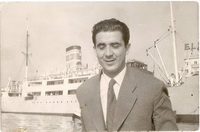
Mr Giorgos Potamianos
of Epirotiki Lines
|
On July 16, 1962 the "Pegasus" made her inaugural call at Famagusta and Limassol. A reception on board had been organized. Mr. Phokion Potamianos, a director of Epirotiki Lines and ex Secretary-General of the Greek Ministry of Merchant Marine was on board the "Pegasus" to receive, together with the Master of the ship Captain Hadjidakis and the General Agent Mr. Takis the distinguished guests i.e. H.E. the Ambassador of Greece, etc (see cuttings of 19/7/62 Cyprus Mail & Fos). Thereafter, both ships were performing the weekly service during the Summer Season every year and Takis was considered throughout to be the "enfant gate" of Epirotiki. In 1964, George A. Potamianos, Managing Director of the Company, had baptized Takis son naming him George, after his own name.
The cooperation of Takis with Epirotiki's weekly service Italy-Greece-Cyprus Israel during the summer season went on until 1967. During these years of operation of their passenger-car ferry service, Epirotiki was gradually developing, in parallel, the cruise business, in cooperation with various European Tour Operators, accepting round-trip passengers. At the same time, Takis was also increasing his liner traffic out of Cyprus year after year, until he got to a point that he could no longer secure the necessary allotment of cabins in order to meet his existing requirements. Obviously, Epirotiki was giving preference to the Round-Trip Venice-Venice passengers.
|
Inevitably, Takis, had to look for another ship owner to operate the line Greece-Cyprus and, as such, he thought of Efthymiades who had quite a number of Ferries operating domestic services in Greece. Epirotiki did not appear to like the idea and decided to break their relations with Takis and to appoint "Louis" as their agent for Cyprus, who was continuously running after them for this purpose. In actual fact the real reason for Epirotiki doing so, was their wish to include Ephessus in the itinerary in order to make it more attractive to Round-Trippers, something that Takis was strongly opposing to, because, the idea of having a Turkish port in between, would unfavourably affect the bulk of the Greek-Cypriots' traffic to/from Greece which, indeed, was the back bone of the whole operation.
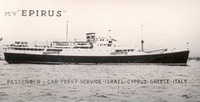
MV Epirus
|
During the year 1961-1962 another line, under the general agency of Takis the New Epirotiki Line, had also operated the Greece-Cyprus service with their S/S "Epirus", Kolokotronis" etc. The Owner of the company, Mr. Petros Potamianos, a brother of Anastassios Potamianos, the Chairman of Epirotiki Line, was quite a character. Once I was in his office in Piraeus and he asked me to go with him to the port to get an idea of the port handling of one of his ships, operating a domestic service, which was coming from Kefallonia. When we arrived there, we saw a number of women dressed in black clothes, on the dock crying. Mr. Petros asked what was going on and an officer of the ship who was there explained to him that they were waiting for the corpse of a relative of them to be off-loaded. |
We boarded the ship and Mr. Petros went straight into the Purser's office, he asked what was the freight collected by the Agent at the port of loading for the coffin and they told him that the normal freight for general cargo was collected. He got upset and explained to the Purser that the coffin is a kind of precious cargo and the freight is by far higher to the freight on general cargo. He explicitly stressed to the Purser not to deliver the coffin to the consignees until the additional freight was collected. The women waiting outside were now weeping and screaming more than before saying that they didn't have the money but, Mr.Petros was adamant. They had to pay and finally they did in order to be able to take delivery of the coffin........... the precious cargo!
Another unforgettable incident with Petros Potamianos. It was a Saturday afternoon in late September, 1962. We were expecting one of his ships, the "Epirus" to arrive at Limassol the next day, Sunday, to disembark passengers from Piraeus and to take passengers, mainly students, who were going to Greece for attending their university studies. It was the peak of the season and, as a matter of course, the ship, being under Greek flag, was taking for every trip from the Port Authorities in Piraeus, an Exemption Certificate covering the number of passengers in excess of the number stated on the Passenger Safety Certificate. This time, actually being close to the end of the high season, we did not advise the owner to arrange for an Exemption Certificate as we did not expect the number of our passengers to exceed the number which was covered by the Passenger Safety Certificate. Takis realizing that we had quite a number of passengers in excess of our expectations and that allowed by the Passenger Safety Certificate, had gone to the port to explain to the Authorities the problem and to request for permission to embark all the passengers on the understanding that the ship would provide the necessary Exemption Certificate the next trip. Unfortunately the Port Authorities were adamant and, the least they would accept would be a telephone call from the harbour master in Piraeus confirming that it would be in order for them to allow all the passengers to embark and that a Certificate to this effect would be sent to them by the ship next week. Actually, on a Saturday afternoon, the harbour master in Piraeus would be on a long week-end holiday. Nevertheless, Takis got Mr. Petros Potamianos on the phone from the port manager's Office and explained to him the position. Mr. Petros was quite prompt in his decision. He assured Takis, so to say, that he would go himself to find the Piraeus port's harbour master, hopefully in half an hour, and ask him to call his colleague in Limassol. I stayed in the office of the port manager waiting for the call from Piraeus. Indeed, in about half an hour the phone rang. It was the harbour master of Piraeus (?) (Plotarchis....) confirming that it would be in order for the ship to take the passengers.
The next day, Sunday morning, the port authorities, had second thoughts and advised Takis that they were not prepared to allow the embarkation without having a proper Exemption Certificate. It was obvious that they suspected Mr. Petros to have been on the phone himself and not the harbour master of Piraeus. Takis advised accordingly Mr. Petros who readily answered "Mr. Takis you are the agent and the ball is now in your court. Do whatever you can Taki. Takis a real fighting type when it comes to protecting the ship's interests and his reputation as a shipping agent, had decided to make an all out effort. It would be a real struggle but, nevertheless he had to go through it. He tactfully urged the students to jump over the rails into the motor-launches. The customs guards, started threatening the boat-men that they would lose their license or work in the port if they moved their boats and Takis on the other side telling the boatmen that if they were not carrying the passengers to the ship, the ship would not call at Limassol again, thus, they would lose their business in any case, assuring them at the same time that he would support them all the way if they took the passengers. Finally all students got into the boats and the boatmen drove them to the ship at the anchorage. When they got there, they found the customs guards in their own motor launch along side the gangway not allowing the passengers' boats to go near the ship. Takis, in his agency boat proceeded towards the bow of the ship and shouted to the bosun, who was up on the bridge watching the developments, to lower the gangway on the other side. The boatmen got the message and drove the boats towards the other side but the customs guards who were following the guidelines of Takis, with their faster boat, had gone there first and blocked the gangway.
This, backwards and forwards situation went on for some time when the police patrol boat arrived to give a message to Takis from the chief superintendent of police who came down to the port, asking him to leave the ship and to go back to the port for attending a meeting with the authorities. Takis explained to the captain of the ship who was following the operation, that things should remain idle until he comes back. The meeting was attended by all concerned i.e., port Authorities, immigration, etc. The police superintendent, addressing himself to Takis, explained that he was not there to investigate who is right and who is wrong but to arrange for the requirements of the port authority to be complied with. Nevertheless, we were ready to hear the views of the port authorities and those of Takis. It was then made quite clear by Takis that he, himself, had followed the instructions of the port authority and he was not to blame if the latter had eventually changed their mind. However, the fact is that we have a considerable number of students who, unless they leave tonight by the "Epirus", they would lose their registration in their respective Greek universities. The police superintendent repeated to Takis his position but at the same time, he tactfully, closed his left eye, in a way that he was telling Takis to go ahead, and departed in haste. Takis went out of the room and got hold of a police sergeant explaining to him the position. The sergeant, knowing well and having full confidence in Mr. Edema undertook the task and stopped the interference of the police in the embarkation. All passengers went on board, the ship left for Piraeus in time for the students to attend to their universities, the required Exemption Certificate was delivered next Sunday to the port manager and the whole case was closed to the satisfaction of all concerned the more so to that of Mr. Petros Potamianos.
In 1963, Takis had managed to secure the agency of Greek Australia Line. At that time, emigration to Australia was developing gradually but it was a kind of adventure for Cypriot emigrants to travel to a foreign, Greek or Italian port in order to be "transshipped" to an ocean liner bound for Australia. Takis with his usual persuasive attitude, had managed to convince the owner Mr. Anthony J.Chandris, to agree that it would not be a bad idea if his RHMS "Patris", operating the Greece-Australia line, was making a short call at Limassol.
On July 3, 1963 the "Patris", on her way from Piraeus to Port-Said, called at Limassol for 2 hours, taking 85 Cypriot emigrants to Australia. (see article 5/7/63). The previous agents of the line, having realized the multiplied importance of the line, now offering direct sailings from Cyprus to Australia, had expressed their renewed interest to the owners, asking, at the same time, for some special concessions, i.e. a fixed allotment of accommodation, overriding commission, etc. The company, having some how, their conscious for having taken their agency away from them (a leading shipping company) instructed Takis to cooperate and comply fully with their requirements. Takis suspecting their ultimate intentions to step in the market, offering to Travel Agents the same, if not better, under the counter, terms than his own, in order to be able to secure their support and, eventually, prove to the owners that they, themselves, had a virtual control of the traffic, likewise, standing a good chance to regain the agency. The Director of the company in Athens, Mr. Notis Panayiotopoulos, in charge of the East-Med and European area, repeated firmly his instructions to Takis but Takis continued to be adamant. Under those circumstances, the big boss in London, Mr. A.J. Chandris, had to interfere sending a message to Takis: "Comply fully with the instructions already given to you otherwise, in the same easy way that you got the agency, you are going to lose it, owing to your thickheaded attitude. Takis did not hesitate to reconfirm his previous decision, indicating, at the same time, 8 WHYs he was not able to follow the company's instructions, adding in the end " I better lose now the agency for not being obedient to the company's wishes than, later on, for not having been able to prove myself as the competent agent". Thereafter, Takis was known in the company with the nickname of "The agent of the eight WHYs" and the "Patris" continued her regular calls at Limassol every 2 months, taking a constantly increasing number of Cypriot emigrants.
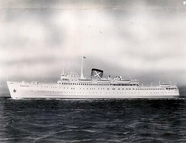
TSS Fantasia
|
In 1964, thanks to the recommendation of Mr. A. J.Chandris, Takis was entrusted with the Agency also of Chandris Cruises, owned by his brother, Mr. Demetris J. Chandris. In no time, Takis, was in London discussing with his new principals, the possibility of including Limassol in the ports of their Mediterranean cruises. It was there and then decided that their S/S "Fantasia" could serve the purpose, her first call being scheduled for 21/3/64 (See article 11/3/64). Regrettably, the Limassol calls of these cruises had, eventually, been cancelled due to some political disturbances in Cyprus which had rendered the insurance premium for calls at Cyprus ports, prohibitive. The "Fantasia" actually called at Limassol for the first time on March 24, 1967 with 350 tourists on board, mainly British, who enjoyed their shore excursion, particularly their shopping, Cyprus being, at that time, the only port in their itinerary, within the sterling area (see article 28/3/67).
|
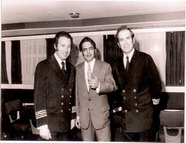
L-R Staff Capt Alexandros Freris
Mr Doros Michaelides
and Capt Loucas Tsichlis
on board SS Regina at Famagusta
|
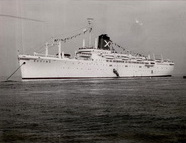
SS Regina
|
In 1967 the TSS "Regina" flagship of Chandris Cruises, had also inaugurated her Mediterranean cruises, calling at Limassol for the first time on May 19 and taking passengers also from Cyprus to Beirut, Haifa, Heraklion, Piraeus, Katakolon, Corfu, Dubrovnik, Venice (see article 1/10/67). The "Regina" continued calling at Limassol regularly every two weeks and her cruises became remarkably popular and unforgettable to those who had the chance of taking a cruise.
|
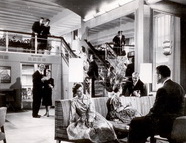
SS Regina
|
In 1967 the Cyprus government asked the Greek military junta Government in Athens to withdraw its army division from Cyprus. In this context we were asked by the General Command of the National Guard (ΓΕΕΦ) to participate in a meeting, which was presided by General Georgios Grivas Digenis, to assist with the planning of the operation. After our suggestion it was decided that the army division should depart from the port of Famagusta, not Limassol, due to the better infrastructure of Famagusta's port. For the task three ships were used namely F/B "Minos" and F/B "Phaistos" of Efthymiades Lines and S/S "Margarita" of John S. Latsis. All three ships were under our agency. The operation was carried out primarily by my cousin Doros Michaelides who was with me since my early beginning in 1956 and at that time he was in charge of our office in Famagusta. Doros was a very competent, hard working port operations / ship agent and thus the operation was completed without any delays or problems.
In 1968, April 13, the luxurious ferry-boat TSS "Lindos" of Efthymiades Lines, with a service speed of 22 knots and a carrying capacity of 1020 passengers and 120 cars, called at Famagusta and thence to Limassol, inaugurating her weekly service Piraeus-Rhodes-Limassol. The call at Famagusta was arranged, exceptionally, so that Archbishop Makarios, President of the Republic, would be able to attend the spectacular reception which took place on board (See article 16/4/68). Many people, mainly of the shipping trade, basing themselves on the existing statistics of passenger movement, were of the opinion that Takis was crazy to encourage a ship owner to operate the Greece-Cyprus service on a regular basis with a ship of such capacity relying on the traffic out of Cyprus alone. The "Lindos" maintained her regular weekly service and, the year after, in 1969, increased the frequency to by-weekly disregarding her previous employment which was combined with domestic operations.
In the meantime Takis had opened office branches throughout the island. In 1969, he thought that it was a "must" for him to establish an office in Athens in order to develop traffic also from Greece to Cyprus. He spotted an office at Filellinon Str., 4, at the Constitution square, the centre of Athens, placing at the top an illuminated sign "Takis Edema Ltd" - "Cyprus Travel Office" and another sign sticking out "Come to Cyprus". The office in Athens soon developed a reputation as a tourism centre for Cyprus. It produced the first tourist leaflet on Cyprus and the first tourist guide book on Cyprus in the Greek language. It also published for 7 consecutive years 1969 – 1976 the monthly magazine "Hellas – Kypros – Toursimos" distributed all over Greece and Cyprus free of charge.
In 1969, July 12, the cruise ship "Delphi" of Efthymiades, calls at Limassol, inaugurating Clarkson's cruises. Mr. Costas Efthymiades, the owner, was on board as well as a group of Greek Journalists not to mention the 500 passengers taking the cruise. A fantastic reception of Greek style was organized and whole baby lambs on skewers and other Greek specialities were roasted and retsina wine pouring out of barrels on the open decks, Greek singers with a bouzouki orchestra playing the Zorba dance music and... name it. When all VIP's and other 400 guests were on board enjoying themselves, a strong loud voice was heard from a distance. It was that of Efthymiades asking the captain, Nicolaos Tamvakis, who was enjoying himself among the guests "Kapetanie, vira tes angyres" (heave up the anchors). In a few minutes the ship was sailing in the open sea. In about an hour or so the motor launches had taken us back in the port with all our guests being thrilled with this unprecedented reception, clapping their hands and cheering whilst going down the ship.
Other ships of Efthymiades were also employed, when needed, in the Greece-Cyprus-Greece service namely the "Ledra", "Knossos", "Island of Cyprus", "Patra", Arcadi", "Aeolis" etc.
One could reliably state that the insignificant volume of traffic between Cyprus-Greece until the year 1960, consisting mainly of a few hundreds of students per year, had started in 1961 developing in a remarkable way, year after year, thanks to the lines attracted by Takis to perform the service. Takis, more than often, was, himself, travelling with the ships to ensure the well being mainly of his passengers and at the same time assisting in the creation of a reasonable standard of service on board. Takis showed a ceaseless interest to ensure that appropriate attention was given mainly to Cypriot passengers by the Greek crew who used to look down at the Cypriots and make fun of them for their Cypriot dialect, contrary to the attention, if any, given to Greek passengers traveling on domestic routes (Rhodes-Piraeus etc.), whose fares were minimal compared to those paid by Cypriots.
With Takis' efforts Cyprus had gradually become known as a country with regular shipping links with Europe and the Eastern Mediterranean thus creating a tremendous increase in passenger movement and development of tourist traffic. Taking advantage of the regular calls of Passenger Liners in Cyprus and having in mind the importance of building up a Cyprus Merchant Marine force, Takis was also urging Cypriots to go to sea offering them employment opportunities on the Greek ships that he represented.
In 1960 when Cyprus became an independent state, Takis had visualized the idea of Cyprus developing its own ship registry. In order to achieve this he believed that it would be useful to have the support of Greece which had the necessary experience and a long maritime tradition. Takis approached the Secretary General of the Greek Ministry of Merchant Marine Mr. Phokion Potamianos, a remarkable gentleman with international reputation in Maritime Law who expressed his willingness to assist in the realization of this goal. Takis advised the Secretary General of the Cyprus Ministry of Communications Mr Panayiotis Kazamias of his good relations with Mr. Phokion Potamianos and the latter's goodwill to assist in the creation of a Cyprus Ship Registry. Takis then arranged a meeting of Mr kazamias and the Cyprus Ports' Manager, Captain Paul Rossides with Mr. Potamianos in Piraeus in early 1962 during which Mr. Potamianos agreed to undertake the translation of the British Maritime Law as requested by the Cypriot Officials. Takis' conviction was actually based on the principle that with our appropriate legislation on the one hand and the support of the Greek Government on the other we would have been able to secure the interest of most Greek shipowners who had ships under foreign flags.
In early July 1970, Takis was on the "Lindos" taking with him to Rhodes a group of journalists and a group of Travel Agents in an effort to stimulate the creation of some traffic out of Rhodes to Cyprus and v.v. At a certain moment, Takis was approached by the Master of the ship, Captain Lefteris Poriotis, who whispered in his ear that, a gentleman called Stathopoulos, a director of ETVA, actually responsible for the financing of ships, who had apparently observed my great concern about the ship and the passengers, had expressed the wish to make my acquaintance. Captain Poriotis had also made it a point to warn me that the gentleman in question was not a Mr. five percent, meaning that I shouldn't dare to offer anything to him for himself. Together with the Captain, I went to meet Mr. Stathopoulos. We spoke about different irrelevant things, ending up with an invitation for me to visit him in his office for a coffee the next time that I would be in Athens.
In the middle of August 1970, I was in Athens and called Mr. Stathopoulos who was glad to receive me. He went straight to the point and said to me that he had gone through his records and did not find any application from me for financing. I replied that primarily, I was not a Greek citizen but a Cypriot. He explained that, already having my own company in Greece, I was entitled to such facility provided that I could comply with the requirements of the Bank. I clarified that I did not have the money to
contribute to such venture. Getting deeper into the subject, he expressed his intention to go up to 90% financing of the purchase price of a suitable ship for the line Greece-Cyprus. I said that my 10% may mean one million dollars which I do not have. In a kind of ironic but friendly way he loudly said to me; "Oh no, please don't be a malakas" and he went on explaining that I could make arrangements, for instance, with a furniture company to supply all furniture and fittings on board and to accept gradual payment with installments. Such arrangement would be acceptable by the bank. He went on further to explain that the bank is not flooded with money, not knowing what to do with it. On the contrary, he pointed out at his desk's drawers and said to me that there was a million applications for financing inside the drawers. Actually, he said, the reason for which he was prompted to help me in having my own ship was because he was amazed at my personal interest in the business and concern about the ship and the passengers. Still, I was not persuaded to go ahead with this project. No doubt that eventually I had realized how stupid I was and I continued with my agency business.
In 1972 Takis opened an office branch in Tottenham Court Road, London in order to offer better services to the local Cypriot community and to promote tourism to Cyprus. Ferry and train tickets were also available for all European routes making transit to Cyprus for tourists and visitors easier. As Takis' operations were expanding more office branches were opened as follows:
| Head Office: |
|
Limassol (1956) |
Branches: |
|
Famagusta (1964)
Nicosia (1968)
Athens (1969)
London (1972)
Piraeus (1977)
Larnaca (1978)
|
In 1975, a new ship was also on the line Greece-Cyprus-Lebanon, the "Oinoussai" and Takis was acting as Agent. The owner, Captain George Carras, who had a kind of admiration for Takis, had expressed, one day, his earnest wish to have Takis as a partner in the company, offering to Takis up to 50% of the company's shares without Takis having to put any money. The offer was too good to be true and, in any case, Takis refused to accept it, being quite happy as the agent of the ship. Some time later the ship had a small accident and was withdrawn from the service.
Practically, in no time, Takis had arranged for another ship to take over the line. A really beautiful ship, the S/S "Arion" of the Maritime Company of Lesvos started the line Greece-Cyprus-Israel. The ship was operating regularly until, one day she caught fire whilst lying in Haifa port and became a total loss.
|
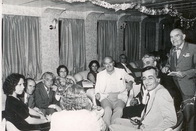
MS Oinousai reception 23 Oct 1976
|
It is worthy to record hereunder statistics of passenger movement by sea between Greece-Cyprus and vice versa:
Notes:
(1) During the years 1964-1967 our share (%) of the traffic was constantly being reduced, due to the unavailability of accommodation on the Epirotiki ships.
(2) From 1968 onwards, the volume of traffic was remarkably increased and our percentage thereof as well.
The operation of Greek Passenger Liners to/from Cyprus was kept up for several years, though with different lines as the owners were not committed to the line and frequently withdrew their vessels from the service. Actually the following lines had served the route of Cyprus with Greece-Italy and the Eastern Mediterranean under the agency and watchful eye of Takis Edema:
1956 Shoham/Zim Lines (Limassol)
1960 John S. Latsis
1960 Kavounidis Lines
1961 Epirotiki Lines
1963 Greek Australia Line
1964 Chandris Cruises S.A.
1966 National Hellenic American Line
1967 Efthymiadis Lines
1968 Lloyd Brasileiro
1970 Clarksons Cruises
1971 Y Barra Y Compania S.A.
1972 Compania Paulista
1972 HEL-IT Line
1972 Fragline
1973 IATA (Approved Sales Agents)
1975 Oinoussai Shipping Co.
1976 Trans Tirreno Express
1977 British Railways Car Ferries (Sealink)
1977 Sol Lines
|
It was a nightmare each year to find a suitable vessel to operate the ferry service between Greece-Cyprus-Israel. Considering the above and also the fact that all passenger liners calling at Cyprus were operating on a seasonal basis thus isolating the island during the winter months Takis had decided to direct his efforts towards securing a ship of his own enabling him to maintain a year-round link of Cyprus with Greece for both commercial as well as national reasons.
Early in 1977, Efthymiades, started having serious problems with his financiers in Germany and Switzerland, who had started to auction his ships one after another. The bankers of Efthymiades approached Takis and offered him financing to acquire F/B Aeolis. In March 1977 Takis established Sol Lines and acquired F/B Aeolis which he renamed Sol Phryne. A new era for shipowning and trade had begun for Cyprus. Being the pioneer of national shipping Takis' Sol Lines had to carry out all the experimental operations with a view of developing the passenger and ro-ro traffic to and from Cyprus. His company Sol Lines was always acting, throughout its existence, as the national carrier of Cyprus, frequently placing the interests of his country above those of his own without ever enjoying any government preferential treatment, subsidies or protection which would enable it to cover part of the losses suffered in the off season or experimental operations.
Sol Lines was losing money during its winter operations with a view to maintaining a year-round link of Cyprus with Greece for the benefit of Cyprus trade and was facing competition from occasional/seasonal operators during the summer months. Takis held the belief that the Cyprus government would soon realize the importance of introducing certain regulations that would support Cypriot ships' interests and protect them against unethical competition from ships operating only during the profit-making summer periods. With this impression in his mind Takis was gradually increasing his fleet with a view to offering a higher degree of frequency of sailings and extending his services to more diversified destinations. In addition to the F/B "Sol Phryne" the following ships were acquired:
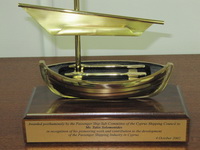
1978 - Hydrofoil "Kometa M"
1980 - Ro-Ro "Sol Georgios"
1981 - Passenger / Car Ferry "Sol Express"
1983 - Passenger / Car Ferry "Sol Olympia"
1985 - Passenger / Car Ferry "Sol Olympia II"
1985 - Passenger / Car Ferry "Sol Christiana"
|
Between 1960 – 1985 the ships under the agency and/or ownership of Takis Edema had carried 52% of the passenger traffic in the line of Cyprus-Greece and v.v.
Paradoxically in 1987 the Cyprus Development Bank, one of the financiers of Sol Lines, financed the purchase of a cruise ship by another local company which was to compete with the Sol Phryne. Furthermore the bank had also acquired a 50% stake in the new company. Unethically the Cyprus Development Bank had used all the shipping knowledge and expertise acquired during its long collaboration with Sol Lines to finance and partner with a competitor thus when Sol Lines needed their support they refused to provide it in order to pave the way for their new partner as quickly as possible. Finally the Cyprus Development Bank also ceased the assets of Mrs Lyghia Edema, Takis' wife, who was a guarantor for loans provided to Sol Lines.
Despite the adverse business environment and the luck of any government support or protection, Sol Lines, managed to continue trading for over than 10 consecutive years 1977 – 1988. It is unfortunate that Sol Lines ceased its operations only a few months before Takis' son Giorgos completed his studies in Economics and Ship Finance in the U.K. as he could have helped Takis to keep and expand his company. Still Takis is proud that during its operation Sol Lines had made a huge contribution to the economy of Cyprus and to the island's international image as a maritime centre. Mr. Takis Edema passed away on the 16th October 2001 at the age of 74.

